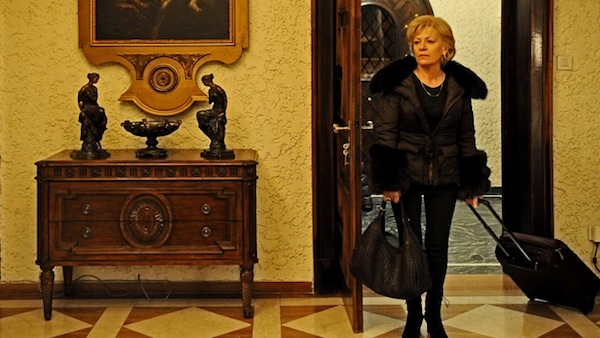You have no items in your cart. Want to get some nice things?
Go shoppingAn exceptional portrait of overbearing maternal love that simultaneously casts an eye over the hierarchies of Romanian society
Part of the way through Calin Peter Netzer’s riveting Romanian award-winner, Child’s Pose, a scene occurs in which a grown man’s mother tends to his wounds. A scene such as this would often be an economical and wordless signifier of her peerless position in his life, and a proverbial slap across the cheek of a marginalised wife or partner (such a scene was used perfectly elsewhere at London Film Festival in Ralph Fiennes’ Shakespeare adaptation, Coriolanus). In this instance, however, and for this mother, pre-eminence is a fading memory despite the fact that its restoration has become her driving desire.
An exchange in the opening scene alerts us that all is not well between Cornelia (Luminita Gheorghiu) and her grown up son, Barbu (Bogdan Dumitrache). All the more illuminating is the reaction of her friend, Olga (Natasa Raab) who bemoans the fact that Cornelia did not have two children, so that she could choose which one to lavish her love upon. It’s a curious response that exemplifies an underlying assumption, in the Romania presented by Netzer and screenwriter Razvan Radulescu, that any situation can be rectified through negotiation and influence.
Cornelia’s extravagant birthday party gives an idea of their privilege, and, with a famous singer and a high profile politician in close attendance, of the circles in which they move. A night at the opera is then rudely interrupted when Cornelia is informed of an accident involving her beloved son. Terrified that he has been hurt, Olga relays that Barbu was, in fact, the driver of a car that hit and killed a young boy. Without a thought for the poor victim, Cornelia’s immediate impulse is the preservation of her son and she instantly sets about applying the appropriate pressure and making the most effective calls to placate the authorities.
Despite being a scathing indictment of a society rife with corruption, this is really an examination of a strained – to the point of breaking – relationship between a mother and son; replete with Oedipal overtones. Amidst all of the greasing of palms and fudging of official records is ultimately a mother’s desperate drive to protect her offspring and a son’s efforts to finally cut a metaphorical umbilical chord. Barbu is imbued with germophobia and a history of sexual failure that serve to emasculate and infantilise him. Once the police have released him from custody, he passively returns to his old bedroom in his parents’ house rather than his home with partner, Carmen (Ilinca Gola).
Cornelia remains cool-headed throughout, never giving up her matriarchal position, and Luminita Gheorghiu is enthralling in the lead role. Never anything less than overbearing, she goes about convincing the only witness to lie about the speed at which he and Barbu were driving when the child was killed. She uses money to pay for the funeral in the hope of inspiring compassion on the part of the grieving family, but meeting them finally cracks her icy veneer.
Despite featuring many of the talent synonymous with work by the likes of Cristi Puiu and Cristian Mungiu, there are several things that set this film aside from other examples of the Romanian New Wave, The camera is kept in close proximity to the actors keeping events very intimate rather than the wider, and more impersonal visuals often associated with the movement. The placement of the action amongst the upper classes also singles it from other contemporary Romanian work.
Having scooped the Golden Bear at this year’s Berlin Film Festival, Netzer’s film has repeated the success of its peers, but it is in its fantastic central relationship and performance that it really excels.
Child’s Pose is in UK cinemas from November 1. Read Litro’s review with the film’s director, Calin Peter Netzer here
About Ben Nicholson
A compulsive cinephile, Ben fell in love with film through repeated viewings of Michael Jackson being transformed into a werewolf behind the scenes of John Landis' seminal video for Thriller. This passion has manifested itself in his consumption of movies and the enjoyment derived from reading, discussion and writing about cinema which can all be found on New Urbanite. His favourite films include The Third Man, In The Mood For Love, Badlands, 3 Iron, Casablanca, Ran, and Last Year in Marienbad - to name but a few.





